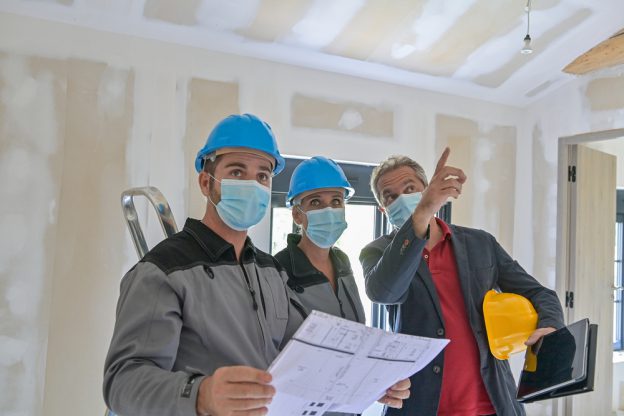With over 100,000 license holders in California, Class B General Contractors make up the majority of construction professionals in the state.
As masters of the basics of construction, general contractors know the fundamentals of every aspect of building – and are responsible for making sure the project comes out the way it’s supposed to.
What Kind Of Jobs Can You Take As A General Contractor: A General Overview
In…general…a general contractor can do a wide variety of construction-related tasks, but usually related only to the fundamental and structural aspects of the building.
They’re allowed to take on structural tasks like framing or carpentry jobs, where that’s all they’re hired to do. Once it goes beyond that, they need to subcontract.
While general contractors can do framing and carpentry, they are restricted from doing additional work on their job sites, unless they have the necessary Class C license to perform the work. Jobs like plumbing and electrical are accessible only to those license holders.
In addition to these general rules, there’s also a patchwork of specific bylaws and regulations as to what types of jobs they can do additional work on, which jobs they can’t, what types of trades they can perform, how many, and so on.
What Does The CSLB Say?
When it comes to ensuring your work as a general contractor is legally compliant and totally above board, it’s important to always follow the CSLB codes and regulations to a T.
Here’s what the CSLB has to say when it comes to jobs Gen Cons can do:
“Business & Professions Code
Division 3, Chapter 9. Contractors, Article 4. Classifications 7057.
Except as provided in this section, a general building contractor is a contractor whose principal contracting business is in connection with any structure built, being built, or to be built, for the support, shelter, and enclosure of persons, animals, chattels, or movable property of any kind, requiring in its construction the use of at least two unrelated building trades or crafts, or to do or superintend the whole or any part thereof.
This does not include anyone who merely furnishes materials or supplies under Section 7045 without fabricating them into or consuming them in the performance of the work of the general building contractor.
(b) A general building contractor may take a prime contract or a subcontract for a framing or carpentry project. However, a general building contractor shall not take a prime contract for any project involving trades other than framing or carpentry unless the prime contract requires at least two unrelated building trades or crafts other than framing or carpentry, or unless the general building contractor holds the appropriate license classification or subcontracts with an appropriately licensed specialty contractor to perform the work. A general building contractor shall not take a subcontract involving trades other than framing or carpentry unless the subcontract requires at least two unrelated trades or crafts other than framing or carpentry, or unless the general building contractor holds the appropriate license classification. The general building contractor may not count framing or carpentry in calculating the two unrelated trades necessary in order for the general building contractor to be able to take a prime contract or subcontract for a project involving other trades.
(c) No general building contractor shall contract for any project that includes the “C-16” Fire Protection classification as provided for in Section 7026.12 or the “C-57” Well Drilling classification as provided for in Section 13750.5 of the Water Code, unless the general building contractor holds the specialty license, or subcontracts with the appropriately licensed specialty contractor.
(Amended by Stats. 1997, Chapter 812 (SB 857).”
So…What Types Of Jobs Can A General Contractor Perform?
Sometimes the CSLB can use language that makes your head spin. There’s a lot of legalese and specific, confusing language in there that can have general contractors wondering if they’re staying compliant. So what exactly are they saying here?
The long and short of it is, if you’re a general contractor, you can do framing and carpentry on any job that is framing or carpentry only. Any more than two trades, you gotta hire it out!
If you’re a general contractor with a Class C license, you can do any Class C work on your job.
Wrapping Up
If you’re a general contractor, chances are you’re probably not doing the work yourself. You’re already deeply familiar with your limitations and your expertise – and why get your hands dirty when you can just hire someone else to do the work for you?
When in doubt, though, follow these simple guidelines. General Contractors:
- Can Perform Construction Work On Framing and Carpentry Jobs
- General contractors can sign contracts and self-perform work that involves framing or carpentry projects.
- There is an exception: you cannot do framing or carpentry work if the project involves two or more trades.
- Can Engage In Licensed Trade Work
- GCs can also engage in contracts for a single trade, but if they lack the necessary specialty classification for that trade, they are required to subcontract the work to a contractor with the appropriate classification.
- This does not include carpentry or framing!
- Can Undertake Multiple Unrelated Trades
- A general contractor can enter contracts for two or more separate and unrelated trades and self-perform the work if they hold the correct license for each respective trade job.
- Once again, framing and carpentry cannot be counted as one of the trades – they must be one of the other Class C Classifications!
